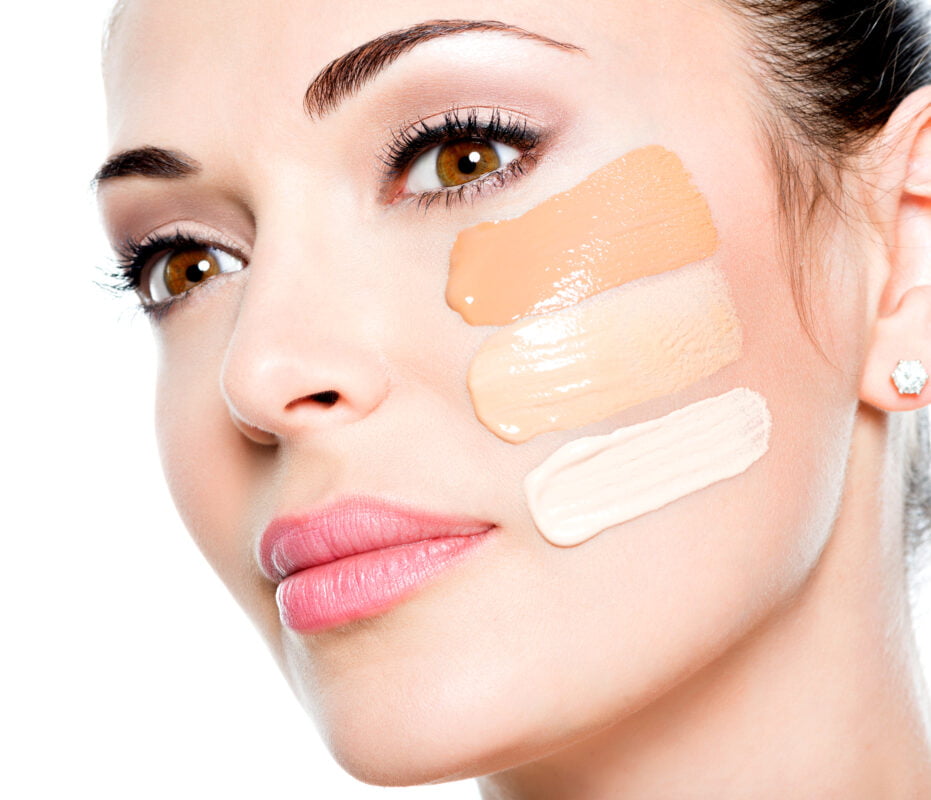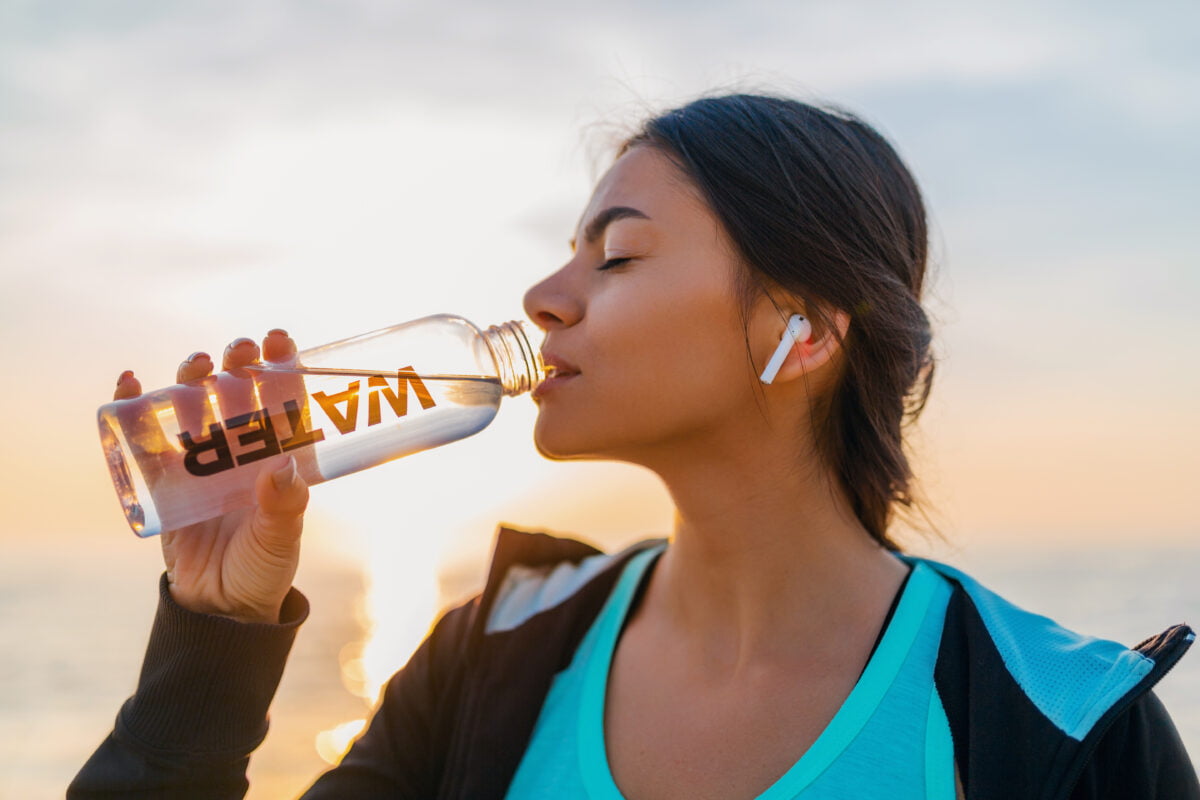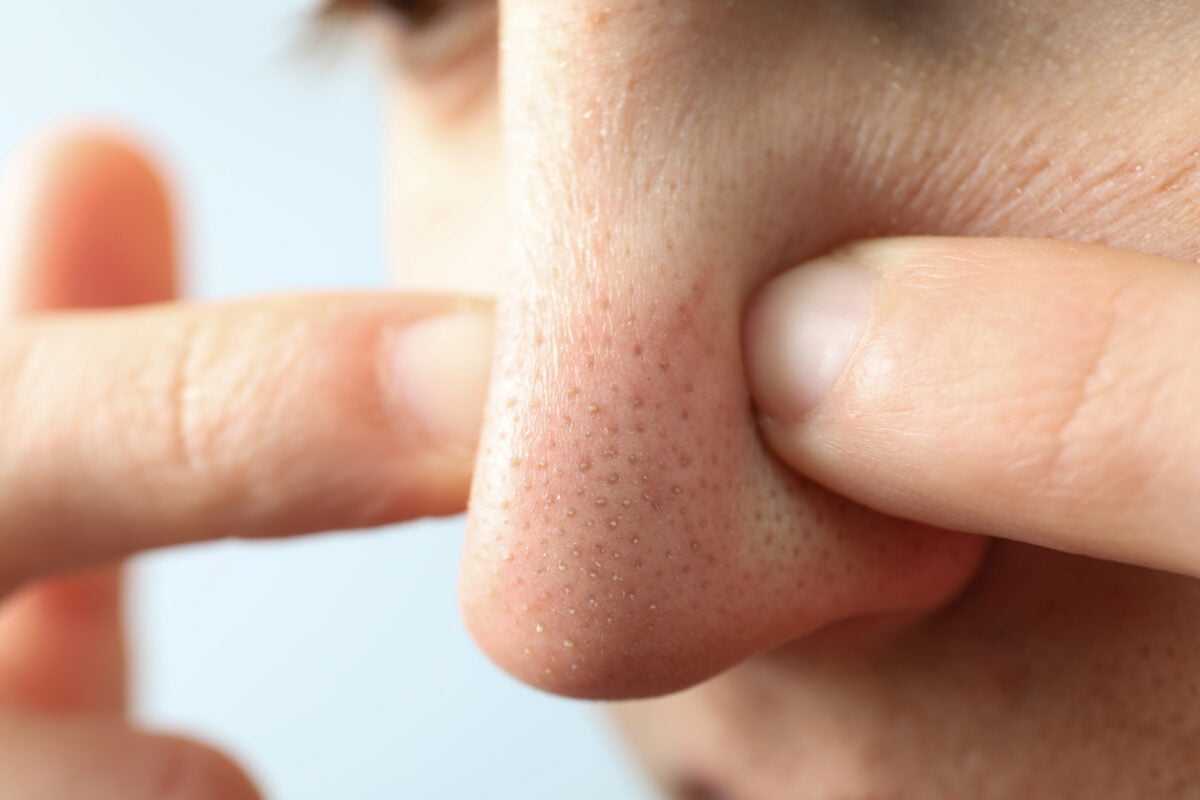Are you having a hard time finding the right foundation for your combination skin that complements your half-oily and half-dry skin type? You’re not alone! People with combination skin often get confused about whether they should buy oily or dry skin foundations. Some end up buying multiple foundations; one to apply on their dry cheeks and another to their T-zone. We’re here to make the selection easier for you. Below is a list of the 5 best foundations for combination skin that will offer you better coverage and glow. Keep reading! 5 Best Foundations for Combination Skin 1. Beautyblender Bounce Liquid Whip Long Wear Foundation Beautyblender has introduced one of the best foundations to meet combination skin needs. Bounce Liquid Whip Foundation has a whipped texture made exclusively from the “HyperWhip” process that gives an ultra-light finish and blends easily into your skin. This weightless foundation feels matte on your skin and gives its shine-free look. The hyaluronic acid in its formula helps keep the dry areas hydrated and glowing. 2. Charlotte Tilbury Airbrush Flawless Foundation Charlotte Tilbury Airbrush Flawless Foundation offers full skin coverage, blurs pores, and gives your skin a perfect airbrush look. The foundation contains hydrating and oil-absorbing ingredients which makes it an ideal choice for combination skin types. Moreover, this matte finish foundation comes in 44 different shades, ensuring that there is something for everyone. 3. Illamasqua Skin Base Foundation Are you tired of wearing double layers of foundation to hide your combo skin problems? Wear this amazing Illamasqua lightweight skin foundation to give your skin a lightweight and flawless coverage. Some users claim that the foundation is as light on your skin that it feels like a second-skin finish. In addition, Illamasqua’s amazing formula gives your skin a matte look with a touch of sheen. It contains hyaluronic acid and niacinamide that help fade redness, maintain oil production, moisturize the skin, and give it a soft glow. 4. Kosas Revealer Skin-Improving Foundation SPF 25 Looking for a foundation that not only gives a brilliant makeup look but also protects your combo skin from sun rays? Kosas Revealer Skin Improving Foundation is the way to go. This lightweight skin foundation is available in 36 different shades and gives your makeup a dewy finish. The foundation has been formulated with the best skin hydrating ingredients, such as hyaluronic acid, that will quench your skin’s hydration needs and keep it healthy. It also contains niacinamide to help suppress excess sebum production, which means its regular use may help prevent blemishes. Moreover, this all-in-one foundation comes with SPF 25 so you don’t have to layer up your skin with sunscreen or moisturizer separately. 5. Charlotte Tilbury Beautiful Skin Foundation Wearing Charlotte Tilbury’s Beautiful Skin Foundation helps you achieve plumper and glowy skin in just a few minutes. The foundation is available in 30 breathable shades so you can get a non-cakey makeup look. Moreover, its formula contains hyaluronic acid that not only helps keep your skin healthy and hydrated but also ensures an ultra glowing finish. We hope this list of best foundations for combination skin helps you find the right foundation for a flawless makeup look. Do you have something to add to the list? Do share with us in the comments section.
Monthly Archives: May 2022
Finding the right sunscreen for dry skin that works best in both winter and summer might be challenging for a lot of people. You need a sunscreen that not only keeps your skin moisturized and hydrated but also gives you a non-greasy look in hot summers. Cut down your search time in finding the perfect sunscreen for your dry skin. We are here with the list of five best sunscreens for dry skin types to help protect your skin from UV damage. 5 Best Sunscreen for Dry Skin 1. SkinKraft Sunscreen Dry-Touch Perfect for dry to slightly dry skin types, SkinKraft Sunscreen is a lightweight sunscreen that quickly absorbs into your skin after application. The best thing about this dry-touch sunscreen is it doesn’t feel sticky or heavy on your face, so you can easily wear it on cold winter to sunny summer days. On top of that, its application gives your skin a gentle moisture effect and comes with SPF 50 to protect your skin from UVA and UVB rays. 2. Neutrogena Ultra Sheer Face Lotion SPF50 Neutrogena Ultra Sheer Face Lotion with SPF 50 and a Helioplex XP™ helps protect your skin from different skin problems caused by sun rays. These include sagginess, wrinkles, uneven skin tone, and more. Neutrogena Ultra Sheer Location is ideal for people looking for a sunscreen that is not only non-sticky but also feels light on the face and gives a good moisture effect. This water and sweatproof sunscreen provides a broader spectrum of protection to your skin without appearing greasy at all. 3. Bioré UV Bright Face Milk SPF 50 Biore with SPF 50 works both as a moisturizer and foundation primer. Its excellent formulation helps mattify the greasiness, calm uneven skin, and protect the skin from harsh sun rays. The sunscreen may leave behind a white layer on your skin after initial application. However, this white cast goes away after a few minutes as soon as your skin color adapts to it. 4. HERA Sun Mate Protector SPF 50+ If you’re experiencing skin problems like pigmentation, inflammation, and redness along with excessive dryness, then HERA Sunscreen might be an ideal choice for you. This is another great product that comes with SPF 50+ and a multitasking formula rich in moisturizer. not only protects your skin from sun rays but also treats pigmentation as it contains exfoliating AHAs and salicylic acid. 5. Kiehl’s Ultra Light Daily UV Defense SPF 50 If you are experiencing suntan or dull skin complexion in addition to dry skin, then try using Kiehl’s Ultra Light Daily UV Defense with SPF 50. It soothes and calms your skin tone while guarding it against harmful sun rays. Moreover, this sunscreen is fragrance-free, oil-free, colorant-free, and non-comedogenic, making it an ideal choice for dry skin types. It also comes packed with a unique blend of soothing oils and vitamin E to nourish the skin and keep it supple. Bottom Line In this article, we’ve presented a list of some best sunscreens for dry skin to protect your skin from harsh sun rays while keeping it well moisturized. You can pick any according to your needs and fulfill your skin’s thirst for moisturization. Do you have something to add to the list? Do share with our readers in the comments below.
The key to healthy and glowing skin is a well-balanced diet composed of fresh fruits, vegetables, nuts, and seeds. Foods rich in protein, antioxidants, and omega fatty acids can help fight numerous skin infections, making it more glowing and youthful. On the other hand, processed foods, alcoholic beverages, and foods having high sugar content are considered unhealthy due to their potential role in causing premature aging, acne breakouts, or inflammation. Remember, topical application of high-quality or expensive skincare products can’t improve your skin health until you follow a healthy diet plan. Let’s have a detailed look at how a particular food affects your skin health. Keep reading! How Does a Healthy Diet Affect Your Skin? Antioxidants, nutrients, and vitamin-rich diet can provide numerous benefits to the skin such as: Reduced aging signs such as wrinkles, fine lines, and pigmented spots Speeding up skin healing by increasing cell turnover Improved skin elasticity Preventing skin from oxidative damage caused by free radicals Managing skin moisture How Unhealthy Food Damages Your Skin? Unhealthy foods such as alcoholic beverages and oily, processed, baked, and fast foods can damage your skin health by disturbing the hormonal balance. Moreover, regularly consuming such foods can damage your digestive system, leading to various health and skin problems. Refined sugars can cause a rise in blood sugar and lead to acne breakouts or pimples. Research states that the high sugar content can hinder the repairing process of skin cells and promote glycation, inducing the aging signs. The most common issues caused by unhealthy foods may include: Acne breakouts Inflammatory skin lesions Increased risk of oxidative stress Enhanced skin sensitivity Chronic skin diseases Skin-friendly Diets and their Role in Improvement of Skin Health Nuts and Seeds You’d see a clear difference in skin texture and glow by regularly consuming nuts and seeds. Almonds, walnuts, cashews, chia seeds, and flax seeds are packed with healthy vitamins (A, C, and E), essential fatty acids, and minerals (zinc, copper) needed for radiant skin. Moreover, high amounts of antioxidants protect the skin from pollutants, microbial infections, and oxidative damage. Fresh Fruits and vegetables Fresh fruits and vegetables contain plenty of nutrients, antioxidants, carotenoids, and vitamins. These nutrients can heal the damaged cells, improve skin elasticity, tighten pores, and promote the reproduction of new cells. Antioxidants protect the skin from harmful chemicals, pollutants, and microbial infections, hence reducing the risk of acne. A number of beneficial vitamins present in fruits and vegetables can help prevent wrinkles, hyperpigmentation, and rough patches on the skin. Moreover, vitamins can also replenish your skin’s collagen, which is essential for a juvenile or tightened skin texture. Sunflower and Olive Oil Around 75% of the fat in olive oil comprises monounsaturated fatty acids which greatly contribute to healthy skin. Olive oil contains polyphenols which can boost the immune system and protects the skin from oxidative stress and various infections. Linoleic acid is the main ingredient of sunflower oil which helps the skin protect its natural barrier by fighting free radical damage and reducing inflammation. Fish Fish like salmon and herring are rich in protein, vitamin E, and healthy fats which stimulate the synthesis of collagen and elastin proteins essential for healthy, blemishless skin. Omega-3-fatty acids in fish help combat skin inflammation and reduce acne risk. Vitamin E keeps skin well-hydrated and well-nourished by retaining its natural moisture. Bottom Line What you eat has a great impact on your skin’s appearance and health. Natural foods can radically improve your skin texture and mitigate aging signs; however, processed and fast foods may lead to various skin problems as mentioned above. So, eat healthy, stay healthy, and get glowing, radiant skin.
The healing of skin cells largely depends on your food choice. A healthy and balanced diet comprising proteins, healthy fat, fresh fruits, and raw vegetables are best for increasing cell turnover and healing damaged or injured skin cells. However, unhealthy food choices such as fast food, alcoholic beverages, and processed foods can slow the cell’s recovery process. Let’s have a look at some best food choices that can exceptionally boost the repairing of the damaged cells either after an injury or surgical procedures. Best Foods for Boosting Skin Healing Process Avocado Avocados are packed with healthy fats, vitamin E, and soothing properties, making them an ideal choice for boosting wound healing. Vitamin E can also help the skin cells prevent premature aging signs by tightening skin, preventing sunburn, and rejuvenating skin. Moreover, a high quantity of plant sterols, antioxidants, and essential minerals can induce collagen production and reduce inflammation, thus leading to healthier skin. Coconut The healthy fats and vitamins present in coconut can help minimize skin pores, thus preventing acne breakouts. It also contains vitamin C which helps repair damaged skin cells and combats oxidative radicals. Furthermore, coconut oil is a supernatural moisturizer for dry, flaky, and acne-prone skin types and leaves skin extra glowing. Yogurt Known for its healing and anti-inflammatory properties, yogurt is a prebiotic-rich food that can help fight acne-causing bacteria. Furthermore, it contains a large quantity of protein that can help nourish the skin cells by improving skin elasticity and youthfulness. Yogurt also helps restore the natural barrier of skin required for protection against bacteria or environmental pollutants. Berries Berries are filled with healthy nutrients, antioxidants, and vitamin C that can help speed up the process of wound healing by promoting the production of collagen. The high level of anthocyanins (antioxidants) found in berries can help strengthen the immune system and fight oxidative stress. The National Institute of Health states that anthocyanins have anti-inflammatory and antimicrobial properties, thus helping protect against non-communicable diseases and multiple skin infections. Nuts and Seeds Nuts and seeds such as almonds, walnuts, hemp, and sunflower seeds contain a high amount of plant proteins, vitamin E, minerals, and healthy fats that can help boost the skin healing process. Vitamin E can also improve immunity, help fight infectious diseases, and repair injured or dead skin cells. Soy Having a high amount of antioxidants such as isoflavones, soy is highly beneficial for increasing cell turnover and repairing injured skin cells. Moreover, it can reduce premature aging signs such as wrinkles, fine lines, and pigmented skin. Salmon Salmon contains a high quantity of protein, iron, zinc, and omega-3- fats. Studies claim that taking omega-3-fats can help regulate the immune system, heal damaged cells, and fight inflammation. Salmon can also reduce the risk of hyperpigmentation, eczema, and sunburn, hence helping you get healthier and juvenile skin. Bottom Line While recovering from an injury or skin damage, you must take foods high in nutrients that help your body heal and recover. Anti-inflammatory and high-protein diets can boost the skin’s healing process. Furthermore, make sure to get plenty of rest, stay hydrated, and refrain from smoking and drinking alcohol to promote maximum healing.
Picking the right foundation that matches your skin tone and skin type can be tricky. And if you have dry skin, that means double the effort. But no more cakey or parched makeup look! We have compiled this informative guide on the five best foundations for dry skin to make it easier for you to create a flawless makeup look. 5 Best Foundations for Dry Skin 1. Charlotte Tilbury Foundation Are you fond of full coverage makeup look but always end up creating a foundation faux pas look such as cakiness making your pores more prominent? Consider using Charlotte Tilbury Foundation to achieve full coverage makeup without the risk of dry lines or cakiness on the skin. It gives your skin an airbrushed look by effortlessly covering pores, pimples, and dark circles under the eyes. On top of that, it comes in 44 different shades so you can use one that matches your skin tone. 2. Jane Iredale Dream Tinted Moisturizer If you have dry skin, then Jane Iredale Dream Moisturizer is going to be one of your favorite foundations. It does not only help you create a flawless makeup look but its tinted moisturizer also keeps your skin well hydrated. Jane Iredale contains titanium oxide that protects your skin from sun rays and treats any redness on the skin caused due to dryness. Besides soothing properties, it also includes algae extracts that prevent moisture loss and keeps your skin supple. Its water-resistant quality makes it last all day long. 3. Catrice True Skin Hydrating Foundation Catrice True Skin is another beauty brand that offers an amazing foundation to its dry skin customers. The best thing about this foundation is it’s alcohol-free and doesn’t dry out your skin further. When you apply this foundation, it quickly melts into your skin. Its lightweight liquid formula gives your skin a soft natural look. In addition, the Catrice hydrating version contains hyaluronic acid that helps keep your skin moisturized and hydrating. 4. Fashion Fair SkinFlex Stick Foundation Fashion Fair is one of the first-ever black cosmetic lines introduced 56 years ago. If you have a dry, dark skin texture, then this foundation can be a great choice for you. Fashion Fair Skin Flex Stick offers 16 different shades, which means almost every black girl finds a perfect foundation match here. The foundation’s version for dry skin includes soya bean oil which has antioxidant-rich hydrating properties and keeps the skin moisturized. It also contains vitamin E which helps soothe inflammation. Plus, the lightweight creamy formula is easy to blend and doesn’t make your pores look more prominent. 5. Kosas Tinted Face Oil As its name says, this foundation feels much like face oil. If you are looking for a lightweight hydrating foundation for your dry skin, then give Kosa’s a go. This weightless foundation comes in 16 different shades. It’s similar to serum and feels comfy while wearing. Best for those who don’t like wearing heavy foundations as Kosas Tinted Face oil gives a natural, velvety look. Bottom Line We hope the above-shared list of the best foundations for dry skin helps you find the right foundation for your needs. Don’t forget to thoroughly remove any makeup on your face before going to bed to avoid your skin pores from being clogged. Do you have something to add to the list? Do share with our readers in the comments below!
Accutane or isotretinoin is usually considered the ‘ultimate solution’ for severe acne caused by excessively oily skin. It is a derivative of vitamin A that is generally prescribed to treat acne-prone and oily skin. Research claims that Accutane is highly effective in treating or declining acne by minimizing its significant causes. It is potent and efficient; however, it might also show side effects. Many people also ask if oily skin can return after Accutane. Let’s find the answer! How Does Accutane Work? One of the leading causes of oily skin is clogged skin pores caused by dust, bacteria, excess oil, and dead skin cells. The buildup of excess oil in the clogged pores can cause acne as oil assists the bacteria to live and grow their colonies. Thus, the main goal for people with oily skin is to combat bacterial growth in clogged pores. Accutane works by reducing the activity of the sebaceous glands, resulting in less oil production. Bacteria find a less favorable environment to live in, helping skin prevent acne and extreme skin oiliness. Moreover, Accutane also boosts cell turnover rate and prevents skin inflammation. Can Accutane Permanently Shrink Sebaceous Glands? Accutane reduces the pores and shrinks the sebaceous glands to reduce oil production and fight inflammation, thus helping treat acne. Isotretinoin also assists the oil glands in self-destructing. Generally, the Accutane course duration is six months, during which you may experience reduced oil production in skin cells. However, skin oil production may get back to normal limits at the end of the treatment. Can Accutane Show Side Effects? Usually, Accutane is considered a safe drug posing no serious complications; however, almost every patient suffers from mild to moderate associated health problems. Sebum is essential for healthy skin due to its antibacterial and anti-inflammatory properties. It helps hydrate the skin and stabilizes pH, thus acting as a powerful protector. Accutane is directly involved in reducing the activity of sebaceous glands that can lead to dry skin pores. However, extreme sebum reduction in skin cells is the main reason behind the acute side effects of Accutane. Resultantly, the patients may experience some signs such as: Xeroderma or dry skin Cracked lips Dry eye syndrome Eczema Arthralgia Research shows that the activity of sebaceous glands might resume after stopping the Accutane treatment with less severity. Can Oily Skin Return After Accutane? Accutane can help get rid of oily skin but not permanently as some factors may aggravate sebum production. Even after the end of Accutane treatment, the most common cause of oily skin may be hormonal Imbalance. Sebum can be produced by two main hormones named, testosterone and cortisol (stress hormone). The upsurge of these hormones can lead to acne and intense oily skin. A study suggests that doctors should focus on treating endocrinological problems in female patients besides Accutane treatment. This practice can be proved more beneficial for curing oily skin and acne problems. Bottom Line If you’re considering Accutane treatment for your oily skin, I suggest you discuss all the pros and cons with your dermatologist. Remember, no treatment can give you permanent relief from oily skin; however, Accutane is a suitable option for getting long-term results.
Oily skin is the dilemma of millions of people around the globe. It can be caused by hormonal imbalance, genetics, or hot and humid weather. However, sometimes, you may witness sudden skin oiliness without any visual factor. In this case, extreme skin oiliness can be a worrying sign that must be consulted with your dermatologist. This article is going to describe the main reasons behind the sudden change in your skin texture from dry or combination skin to oily skin. Keep reading! 6 Top Reasons Your Face is So Oily All of a Sudden Dehydration Dehydrated skin can be one of the main causes of oily skin. The dehydrated skin transmits signals to the cells about extreme skin dryness. Thus, skin boosts the activity of the sebaceous glands to keep the skin moisturized. An imbalance in the body and skin hydration can cause dull and damaged skin. The healthy way to keep your skin optimally nourished and moisturized is by increasing your water intake. Hormonal Changes The most common factors responsible for disturbed hormones are irregular periods, PCOS, birth control, or pregnancy. Hormonal imbalance can cause hyperactivity of the sebaceous glands, causing increased oil production. Consequently, overactive sebaceous glands may also cause acne breakouts. Over-Exfoliation Handling your skin with gentle care is a prerequisite for healthier and well-nourished skin. Harsh scrubbing may irritate the skin by inducing skin sensitivity and malfunctioning of the sebaceous glands, leading to excess oil, rash, inflammation, or redness on the skin. Try gentle exfoliation, preferably with natural exfoliation products as they are gentle enough for your skin texture. Unhygienic skin Wearing heavy makeup all day long and not removing it before going to bed is an awful practice. It can cause clogged skin pores, leading to oil, toxins, and dust build-up. Thus, skin appears oily as the excess oil can’t absorb in the pores, leading to acne, pimples, and hyperpigmentation. Moreover, popping blackheads can also stimulate oil production, so you must avoid it. Unhealthy Diet A healthy, balanced diet plays a magical role in maintaining skin moisture and glowing skin tone. However, the consumption of fast foods, alcoholic beverages, bakery items, and processed foods has increased tremendously, leading to multiple health and skin-related problems. Besides that, foods with high sugar and salt content or artificial flavors may also induce skin oiliness and acne. Increase intake of fresh fruits and raw vegetables instead of consuming unhealthy foods to get youthful and balanced skin. Certain Skin Disorders Sometimes, specific skin lesions can disturb the healthy balance of skin moisture. The most common skin disorder causing skin oiliness is seborrheic dermatitis, in which greasy patches appear on some areas such as the face, chest, and back. It is an inflammatory disorder that can more commonly develop in patients with Parkinson’s disease, AIDS, and the dysfunctionality of the autoimmune system. Bottom Line If you’re wondering why your skin is suddenly developing excess oil, check your hormones, nutrition, and the skincare products you use daily. Finding the exact cause may help you take the required actions to eliminate the problem permanently. A specific skincare regimen can assist in efficiently dealing with excess sebum.
Skin acts as a thermo-regulator to protect the internal body organs from harsh weather and environmental pollutants. It comprises around 64% water, which means hydration is important to maintain your skin’s elasticity and resilience. Moreover, a well-hydrated skin is less prone to premature aging signs such as wrinkles and fine lines and also helps boost natural skin nourishment. Let’s have a look at how staying hydrated helps you get glowing and radiant skin naturally. 7 Benefits of Hydration for Skin Balances pH Maintaining a good pH balance is essential for blemish-free and radiant skin, specifically in acne-prone skin. Increasing your water intake is vital to keeping a pH balance for healthier skin. Research shows that the acidic pH range (pH 5-6) is considered optimum for the proper functioning of skin microbiota (microorganisms involved in skin protection). However, an alkaline pH range (pH 8-9) may cause the dispersal of beneficial resident skin microbiota, resulting in dull skin texture and radiance deterioration. Improves Skin’s Healing Capacity Dehydration may cause minor cuts, wrinkles, or tiny pimples on the skin. A well-hydrated skin helps improve oxygen and blood flow throughout the body, which enhances the skin’s healing capacity. Nourishing your body with an ample water supply can also help get rid of popped pimples, blemishes, and other marks. Reduces Puffiness Drinking an adequate quantity of water can naturally flush toxins from your body, thus reducing the risk of acne, bloating, and skin puffiness. Moreover, it also boosts the production of skin proteins required for skin elasticity and fragility, thus helping to get juvenile skin. Improves Skin Elasticity An adequate amount of water intake helps regulate skin moisture by balancing its water and oil content. This will improve your skin elasticity and results in firmer skin with more cell turnover rate. Furthermore, adequate body hydration may increase oxygen circulation throughout the body, promoting the production of collagen and elastin proteins. Reduces Skin Sensitivity Dehydrated skin is at a greater risk of enhanced skin sensitivity, leading to acne, blemishes, and frequent infections. A properly hydrated body can nourish the skin by improving cellular functions and boosting its immunity against pathogens or environmental pollutants. Moreover, drinking enough water can also help reduce inflammation by flushing out the harmful toxins, thus providing relief against itchy and irritated skin. Delays Aging Signs Optimum hydration can boost your skin juvenility by delaying the aging signs such as wrinkles and fine lines. It also helps keep the water barrier intact around skin cells, thus protecting the skin from damage and promoting cellular metabolism. Hydration also makes your skin healthy and glowing with fewer chances of cracked, itchy, and flaky skin. Bottom Line From improving skin elasticity and texture to reducing aging signs, staying hydrated can do wonders for your skin. Drink plenty of water to reduce the chances of dehydration and avoid damaged and flaky skin. A topical application of skin moisturizers can also nurture and shrink your skin cells, making them less likely to cause clogged pores. The better the skin is moisturized and hydrated, the less likely to have breakouts. In addition to this, consider taking Diamond Gow with your drinks. It’s a powdered multivitamin supplement that helps nourish your skin, reduce wrinkles, revive skin freshness, and improve overall skin health.
Do you drink enough water to stay hydrated? If not, you’re putting your health at risk of various health conditions such as constipation, dull skin, fatigue, and more. Drinking around 6-8 glasses of water a day is considered ideal; however, the required quantity depends on your body weight. Staying hydrated helps you maintain perfect weight, prevent diseases, combat fatigue, and reduce stress. It also regulates body temperature and improves blood circulation, thus helping attain ideal health. Let’s have a look at some vital roles of hydration in our bodies. Keep reading! 7 Amazing Benefits Benefits of Staying Hydrated for Your Body Helps Weight Loss Increasing water intake helps reduce weight as it provides a satiating feel, thus helping reduce calorie intake. According to a study, consuming around 500ml water combined with a hypocaloric diet before each meal significantly contributes to weight loss than individually following a hypocaloric diet plan. Another study reveals that increasing body hydration may help lose weight in premenopausal women aged 25-50 years. Improves Physical Fitness Staying hydrated can boost your energy and physical fitness. It lubricates joints, strengthens muscles, reduces fatigue, and improves overall health. Moreover, a well-hydrated body enhances the functioning of vital body organs such as the liver or kidneys. So, the body becomes more active and healthy even in old age. Reduces Joint Pain Water makes up about 80% of the cartilage in our joints. Staying hydrated keeps your joints lubricated, which reduces friction by providing an extra “cushion” between the bones. Less friction ensures fewer aches and pains and smoother-moving joints. Boosts Cognitive Functions Well-maintained body hydration is essential for better health and cognitive functions. Many studies indicate that extreme dehydration can have a negative impact on brain functionality and memory status. According to The National Institute of Health, a person’s cognitive performance decreases with every 2% decrease in body weight caused by dehydration or physical exertion. Thus, proper intake of fluids is essential for mental health. Boosts Immune System Keeping yourself well-hydrated is an excellent way to combat various diseases such as constipation, urinary tract infections, cardiovascular problems, kidney stones, etc. A hydrated body boosts your immunity, hence helping fight chronic diseases. Improves Kidney Functioning Kidneys are the body’s essential organs involved in carrying out the filtration process by removing the toxins from the blood. Dehydration often results in compromised kidney functionality, leading to a build-up of wastes or toxins. Proper hydration improves the filtration process, thus improving the GFR (glomerular filtration rate) of kidneys. Helps Prevent Headaches or Migraine Headache is a common sign of dehydration, and drinking enough water can help relieve the symptoms and severity of frequent migraine. However, extensive research is still needed to back the beneficial role of water intake in reducing or preventing headaches. Bottom Line Even minor dehydration can cause mental and physical health problems. To avoid dehydration, try to maintain a minimal fluid consumption target. Drinking recommended amount of fluid in the form of water, juices, or tea can help to boost your body metabolism and improve your overall health. You can also consider taking Diamond Glow with your fluids. It’s a powdered supplement that helps boost energy, improves your skin health, and helps with overall hydration.
The T-zone area, specifically the nose, is the most sensitive area of the skin vulnerable to acne breakouts such as pimples, whiteheads, and blackheads. Whiteheads or closed comedones are non-inflammatory skin lesions that may develop on the nose when skin pores become clogged due to dead skin cells, dust, toxins, or excess sebum. They’re annoying and stubborn that may get worse if not treated carefully. However, you can remove and prevent whiteheads on the nose by knowing how and why they develop. Let’s discuss various causes behind whiteheads on nose and possible treatment options for them. Whiteheads on Nose Causes It’s natural for skin pores to have dead skin cells and oil. Dead skin cells are inevitable since your skin continually produces new ones to replace them. Natural skin oil (sebum) is essential for healthy and well-moisturized skin. However, dead skin cells and excessive oil production can turn your clogged pores into whiteheads. Besides this, there are various other factors that may cause whiteheads on the nose such as: Hormonal changes Pollution and excess humidity Puberty Menstruation Pregnancy Contraceptive drugs OTC Treatment for Whiteheads on Nose Over-the-counter (OTC) medication is one of the most common treatment options for whiteheads. The most effective OTC treatments may include: Salicylic Acid Salicylic acid is used widely in numerous skincare products due to its amazing benefits for healthier, blemishless, and acne-free skin. It is amazingly good for removing the dead skin cells and keeping pores clear from unwanted debris without damaging skin nourishment, thus helping reduce the risk of whiteheads formation. Benzoyl Peroxide It targets bacterial infections and inflammatory toxins, thus reducing the risk of closed comedones and acne. Retinoids Retinoids have been used extensively in the skincare industry for many years due to their ability to boost skin’s natural cell turnover and improve skin texture. They help remove the clogged pores, hence minimizing the risk of acne, whiteheads, and blackheads. Glycolic Acid It is a kind of alpha hydroxy acid and is highly effective in preventing acne breakouts. It opens the clogged pores and removes the topmost dead skin cells, leaving skin youthful and fragile. Azelaic Acid Azelaic acid is a gentle skin ingredient that helps prevent whiteheads formation by keeping skin pores clean. It effectively treats the skin from acne lesions, redness, inflammation, pigmentation, and oily skin problems. Other Tips to Prevent and Treat Whiteheads on Nose It’s better to prevent your skin from developing whiteheads by following a good skincare routine and using high-quality and gentle products. However, sometimes preventing whiteheads is difficult if caused by medical reasons. Some preventive tips are mentioned below that might help treat or prevent whiteheads: Follow good skin hygienic practices to keep your skin from accumulating debris or developing dead skin cells. Ensure using non-comedogenic products to reduce the risk of forming whiteheads. Regular cleansing, moisturization, and exfoliation is the best way to prevent or get rid of whiteheads. Ensure gentle massage or scrubbing as harsh treatment may trigger the development of whiteheads on the nose. Bottom Line Whiteheads on the nose can be tricky to get rid of. Consult a dermatologist if the home remedies or OTC treatments don’t help you eliminate whiteheads on the nose. Untreated whiteheads can cause severe skin problems, leading to skin damage.










